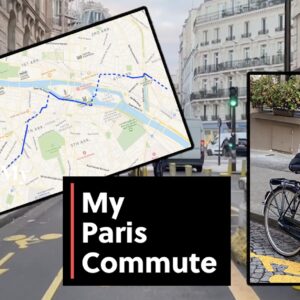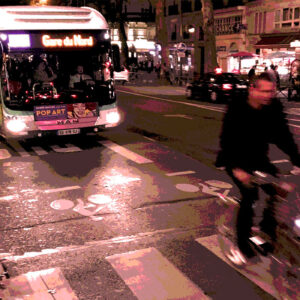
I’ve been in Paris for the past month. Add that to the three months I spent here a year ago, and it becomes the most time I’ve ever spent outside of the US.
I’ve continued to help Jonathan with BikePortland comment moderation, which works out well. With the nine-hour time difference, we can push your comments through twenty-four hours a day!
But being here, and doing that, puts me in a situation I’m not used to—reading about home from afar. There is nothing unusual about this, many people—immigrants, guest workers, refugees, students abroad, military personnel, Peace Corps volunteers—have this experience, but it’s new for me.
Specifically, reading about US transportation issues on BikePortland while in a country which has already, for years, taken bold steps toward safer streets and reduced car use is, well, disorienting.
For example, I’ve taken France’s high speed train, the TGV, twice in the past few weeks. Sandwiched between those two trips was the BikePortland post about the proposed ultra high speed Cascadia line.
The post garnered 69 comments, and it feels like I pushed most of them through. What knowledgeable discussions and debate! BikePortland has a lot of readers who are in the biz, and others who are just plain well-informed.
One comment stuck with me because I knew it was incorrect but didn’t have the facts at hand. The commenter was questioning the carbon savings of high speed rail and challenging the assertion that the train could be an alternative to driving or flying.
Back to France. Within the week, the missing carbon facts rolled by me on the side of the TGV I had just exited. The green text in the photo above says, “Thank you for choosing us, together we emit less carbon: 50 times less than a car, 80 times less than a plane.”
But there’s more. Earlier this month, the European Commission decided in favor of France’s initial steps to curtail domestic air flights to cities which have rapid train service. That’s right, France wants people out of planes and into the train—and the EU has backed them up. The immediate effect of this new ruling will be small, only a few cities qualify for the new regulation, but it is significant in that it gives the green light to this type of regulation in countries throughout Europe, and the conditions can be broadened in the future.
Can you imagine something like that happening in the US?
So I savor my TGV journeys and push your comments through, and I write this without spit or bile. Mostly what I feel is compassion. We’ve got a lot of change coming our way.








Thanks for reading.
BikePortland has served this community with independent community journalism since 2005. We rely on subscriptions from readers like you to survive. Your financial support is vital in keeping this valuable resource alive and well.
Please subscribe today to strengthen and expand our work.
Re: ““Thank you for choosing us, together we emit less carbon: 50 times less than a car, 80 times less than a plane.”
The electricity used by the TGV in France is mostly by carbon-free sources, but most of it is nuclear:.png)
In Oregon we are currently about 48% coal and natural gas, 39% hydro, 7% wind, 3% nuclear, 2% solar. So a Cascadia high speed rail train might have higher carbon emissions, but that depends mostly on the source of new electrical generation capacity.
There are also other carbon consts involved in construction, for exam pouring concrete for viaducts, bridges and tunnels releases carbon. If you include those capital sources of carbon the TGV will not look as green, but then again the motorways in France also have plenty of concrete.
It’s absolutely pathetic how little progress has been made in decarbonizing Oregon’s electricity generation. (Small decrease in total electricity generation emissions are primarily due to reduced industrial, government, and commercial use, not decarbonization of the mix itself.)
It’s surprising to me that we don’t have more geothermal. That seems like an obvious choice for replacing coal plants without having to dam rivers.
Geothermal, offshore wind, tidal generation, and … gulp … transitional nuclear are all options that are not being developed in the so called “green” PNW. As hydro generation continues to inexorably drop, the PNW will increasingly rely on fossil fuels to make up the gap.
Although Geothermal is much less carbon, it still emits a lot of other pollutants we cannot forget about. Hydrogen Sulfide comes to mind… along with others.
Correct, but for any Cascades HSR analysis you really need to weigh the proportion of service hours (etc) by the source of the energy consumed (its not always about Oregon ;-)…Washington State will have the bulk of the service hours (not Oregon) for the foreseeable future, so WAs higher proportion of renewable (~76%) and carbon-free (~84%) energy sources tip the balance more favourably. (And especially once WAs remaining coal powered plant –TransAlta – is converted to non coal use now that OR demolished its last coal power plant.)
OR utilities own coal power plants in other states and/or purchase coal-generated power.
Nuclear should be abandoned world-wide, we don’t need it as a ‘bridge’ fuel; all we need to do is go fully in on renewables, all the technology is already available and has been for decades.
That worked real well in germany as they replaced nuclear with gas generation — and are now firing up coal plants.
And in the USA the modest drop in nuclear generation has been largely replaced with gas generation as per EIA statistics.
Like it or not, nuclear is a bridge fuel — at least for those who give a f*** about the hundreds of millions in the global south whose lives and livelihood is threatened by the USA-caused climate crisis.
Ok Soren’s dead right about this! Nuclear power’s safety history is emotionally charged but its impacts on human life are *minuscule* compared to those of fossil fuels.
Sorry, but the nuclear fuel cycle is dirty and toxic from beginning to end, it’s all carbon intensive with incredibly toxic and carcinogenic waste products at every step of the way which we still can’t responsibly manage. Fuel Cycle = Exploration > Development > Mining > Milling > Refining > Manufacturing > Power Generation > Disposal.
Two small instances of injustice associated with this – should we continue to sacrifice Navajo lands and lives to uranium mining, or Mormon lands and lives to nuclear weapons testing, in order to make believe we have climate change somehow under control? Nuclear has and always will be a BS energy solution, and the civilian nuclear power program was always an excuse to continue to build and maintain the military nuclear weapons program.
But screw it, you absolutely don’t have to believe me on this, I’m just some crazy old anti-nuke boomer. But when the shit eventually hits the fan don’t come looking for me either.
Renewable technology is already fully developed and accessible and it costs a lot less to implement than nuclear. Of the two nuclear will need a whole lot more tax dollars to make happen, will take a whole lot longer to bring on-line, and will result in legacy environmental issues we can’t even imagine if we let it move forward.
But Lisa: ODOT, WSDOT, and probably every other DOT is convinced that widening freeways *reduces* carbon emissions because it means less time idling in traffic. 😉
I agree that we have such a long, long way to go.
Aloha Lisa!…that is great to read that you are traveling and exploring other transport realities (I wish more PNW decision makers had such an opportunity…just remember to NOT spill your Champagne* on your laptop while working and day dreaming out the window. [*A surprise glass of Champagne on our last French train trip 14 years ago is still a highlight with my family…when we got bumped up a class with EuroRail tickets.]
The “aloha” always puts a smile on my face, Todd. And I agree, it’s often those small interactions with people, like a glass of champagne, or an offer of help, that end up becoming the most lasting memories.
Last week, I was at the farmer’s market with my husband. I guess I was looking a little tired so the fishmonger grabbed a bunch of shrimp and gave it to my husband “pour sa femme,” to build up my strength. I went back to the apartment and sautéed them for lunch, they were good!
Lisa, glad he knew enough high school french to know to share the shrimp! 😉
Been there, seen that; USA is currently an empire / civilization in decline so don’t expect too much from any level of government anymore, especially since they also have to listen to and consider what the MAGA crazies are saying also.
FYIGM nihilism and MAGA are both manifestations of imperial lunacy.
I guess you don’t have yours yet, eh? What makes you think I’ve got mine? FY2.
😉
If we hadn’t allowed boomers to scare us out of generating 78% of our electricity by nuclear power we could have nice things too…
Lumping boomers isn’t really helpful. There are all kinds. Anybody born in the 50’s might remember “too cheap to meter”. Nuclear power was going to fix everything, or so we were told.
I know ‘boomers’ who are nuclear engineers, and I know boomers who would rather sit in the dark.
If you wanted to point fingers, the so-called greatest generation gave us nukes on a crash wartime program that incidentally produced toxic messes that we’ll be shoving around for a long time.
‘Atoms for Peace’ was a late 50s-60’s program designed to normalize uses of nuclear for other than weapons of war. Ready Kilowatt was a government mascot for this program, they gave comics out to school kids.
At the 1965 NYC Worlds Fair US Government agency (NRC / AEC ?) was giving out irradiated coins for kids to put in their pockets next to their genitals, WTF?
Navajo lands were decimated by uranium mining and milling from 1940s through 1980s, and when the market for uranium crashed the mining industry just walked away and left all their waste behind, blowing in the wind and leaking into the rivers and streams people and their livestock relied on for fresh water.
There is so much hypocrisy behind the push for a nuclear power ‘rebirth’ it should make everyone’s head spin.
I’m concerned to know that a BikePortland contributor is traveling (internationally, no less!) in the middle of a Global Pandemic. Especially with RSV and Influenza threatening to collapse our hospitals.
I hope to one day leave my house and ride my bicycle again, but it’s looking like 2023/2024 just isn’t going to be the right time for it. Even with N95, a visor and well fitted goggles.
* animated Frye gif goes here.
Five shots, mask in pocket for quick retrieval, and despite repeated exposure, still unscathed, knock on wood.
Lisa,
What’s amazing for me is that 40 years ago I rode the TGV from Lyon to Paris! Enjoy your visit and thanks for your reports on my neighborhood of origin, SW!
Lisa, it’s good to know that you’ve been able to continue working while you’re in France. I worked remotely for many years, but I can’t hold a candle to your current situation. If Jonathan establishes a second office in Paris, being able to moderate comments twenty-four hours a day would be an edge Bike Portland would have over other local news outlets. 🙂
I’ve also never ridden on a high-speed train, so I’m envious of your experience! If (TBD) my wife and I become ex-pats for a while, being able to travel by train will be one of our deciding factors in where to live. We haven’t done our homework yet, but France is appealing. We also have a former connection there who we might be able to call on for guidance.
Our connection was formed many years ago when we hosted exchange students from China and France. One boy from France was the same age as our oldest son. One year after the boy from France returned home, our son spent time with him and his family. Although our son wasn’t able to take high-speed rail when he was in France, he did so years later when he was in Japan.
Meanwhile, until my wife and I are able to take high-speed rail abroad, this announcement two days looks promising for future rail travel in the US: Amtrak Invests in the Future.
However, even with the improvements described, right now I can’t imagine the US curtailing domestic air flights between any cities that Amtrak serves.
Safe travels.
High speed trains regularly come through Portland – Amtrak runs Spanish-made Talgo trains on the west coast – but our tracks have not been upgraded to allow them to travel at their full speeds.
I’ve ridden on both the Talgo and the TGV in France and they are both very popular travel options.